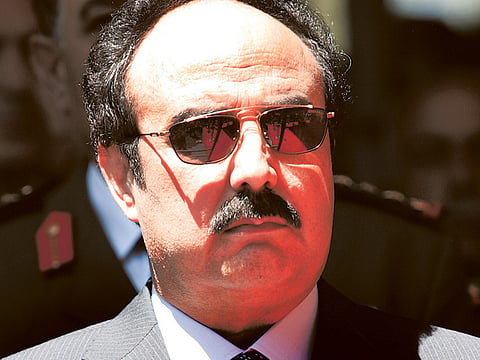Syria ‘got rid of Ghazali’ before STL testimony
Observers speculate that Syria was afraid Ghazali would implicate Al Assad over Hariri killing

Beirut: Brig. Gen. Rustom Ghazali, long a powerful figure in Syria’s intelligence apparatus, has died in Damascus, the capital, a Lebanese television channel reported Friday. Reports simmered for weeks that he had been severely beaten in an internal government dispute.
The Syrian government did not immediately issue a statement, and the cause of Ghazali’s death remained unclear. But the report that he had died, carried by Al Mayadeen, a news channel with access to Syrian officials, raised questions about whether he was a casualty of new rifts in Syria’s power structure after more than four years of conflict.
Confirming parts of recent accounts from Lebanese and Arab news outlets, Syrians with close ties to the security forces said in separate recent interviews that Ghazali, chief of political intelligence, had been beaten by guards at the office of a rival general, Rafiq Shehadeh, director of military intelligence. Both men were said to have been later relieved of their posts.
Ghazali had been Syria’s intelligence chief in Lebanon during Syria’s long occupation of the country, and was feared and despised by critics of the Syrian government here. Many speculated that he helped plan the car-bomb assassination of a Lebanese former prime minister, Rafik Hariri, in Beirut in 2005, which prompted protests that led to the withdrawal of Syrian troops. Syria and the militant group Hezbollah, its Lebanese ally, have denied any involvement.
May Chidiac, a Lebanese news anchor who survived an assassination attempt that she said was the work of the Syrian government, contended on Facebook that President Bashar Al Assad of Syria had “gotten rid of” Ghazali for fear that he would give evidence to a UN special tribunal on the Hariri killing. A confidant of Hariri recently testified to the tribunal that, before his death, the former prime minister had been forced to pay millions of dollars to Ghazali.
But others suggested that Ghazali’s death was related more to disputes within and among Syria’s strained security forces. One Syrian with close ties to security officials said the dispute was over fuel smuggling, after Shehadeh had seized a truckload of fuel being shipped by a relative of Ghazali to armed groups. Arab and Lebanese media had earlier reported another version: that the two generals had tangled over the role of Hezbollah and its patron, Iran, in southern Syria. Ghazali was from the southern province of Daraa. Hezbollah fighters and Iranian advisers have taken a more prominent role lately in the area, which is a strategic region for both of them because it is near the Israeli-held Golan Heights.
A video this year showed what was said to be of Ghazali’s large house in the town of Qarfa being blown up, and the general declaring that he had done it so that no soldier



